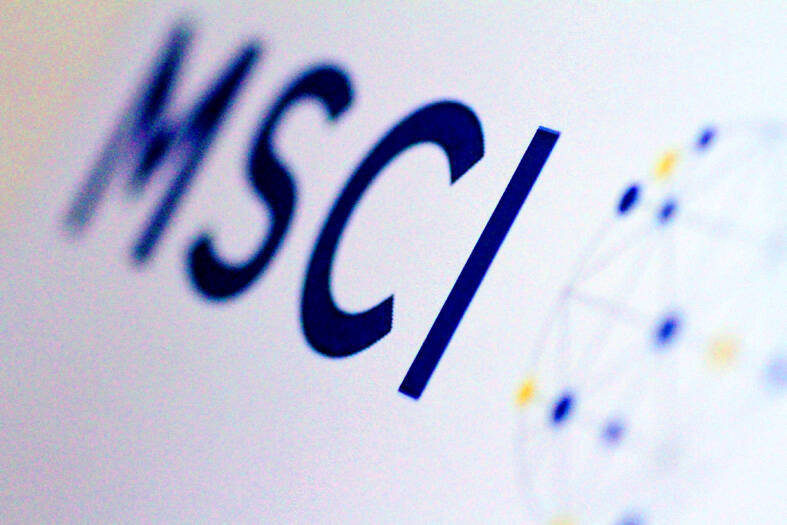The latest move by global index provider MSCI Inc to cut Taiwan’s weighting in its major index is expected to have only a minor adverse effect on the local equity market, the Financial Supervisory Commission (FSC) said on Friday.
The 0.02 percentage point cut, to 13.35 percent, in the MSCI Emerging Markets Index — which is closely watched by foreign institutional investors — should result in a capital exodus of NT$2.24 billion (US$71.31 million), the commission said.
The expected fund exodus would account for only 0.013 percent of market capitalization held by foreign institutional investors, indicating a small effect on the local equity market, it said.

Photo: Reuters
MSCI announced the results of its quarterly index adjustments on Friday morning. China and South Korea each had the steepest cut of 0.08 percentage points in their index weighting.
India and Turkey had their weightings rise by 0.2 and 0.09 percentage points respectively, the top two increases among emerging markets.
Despite the cut, MSCI raised Taiwan’s weighting in its MSCI All-Country Asia ex-Japan Index and MSCI All-Country World Index to 15.51 percent and 1.46 percent respectively, from 15.49 percent and 1.45 percent.
Compared with China’s capital market, Taiwan has a sound legal mechanism in the foreign exchange market with better liquidity and corporate governance, while listed Taiwanese companies have embraced financial disclosure transparency, the commission said.
The local equity market remains attractive to foreign institutional investors, it added.
In addition to the quarterly index adjustments, MSCI added biotech firm PharmaEssentia Corp (藥華藥) and Taiwan Business Bank (臺灣企銀) to its the MSCI Global Standard Indices after the two stocks made sharp gains in recent sessions.
The index provider removed Asmedia Technology Inc (祥碩科技), a high-speed surface integrated circuit (IC) designer, from the index due to its recent slump in share price.
MSCI also added Asmedia into its MSCI Global Small Cap Indices, along with another nine stocks, including Bora Pharmaceuticals Co (保瑞藥業), Delpha Construction Co (大華建設), property developer Farglory FTZ Investment Holding Co (遠雄自貿港投資控股) and connector supplier Hu Lane Associate Inc (胡連精密).
MSCI removed 11 Taiwanese stocks from the MSCI Global Small Cap Indices, including e-commerce services provider 91APP Inc, flat panel maker Amtran Technology Co (瑞軒科技), First Copper Technology Co (第一伸銅科技), high-speed interface IC designer Genesys Logic Inc (創惟科技), biotech firm PharmaEngine Inc (智擎生技) and Taiwan Business Bank.
MSCI added two stocks to the MSCI Taiwan Index while removing one, raising the number of constituents to 88.
PharmaEssentia had the largest weighting increase — 0.37 percentage points — in the MSCI Taiwan Index, while contract chipmaker Taiwan Semiconductor Manufacturing Co (台積電) had the steepest cut of 0.26 percentage points to 40.44 percent due to heavy losses amid volatility among tech stocks in global markets and an aggressive rate hike cycle by the US Federal Reserve.
The index adjustments are scheduled to take effect after the market closes on Nov. 30, MSCI said.
MSCI index reviews are conducted in February, May, August and November each year.

SEMICONDUCTORS: The firm has already completed one fab, which is to begin mass producing 2-nanomater chips next year, while two others are under construction Taiwan Semiconductor Manufacturing Co (TSMC, 台積電), the world’s largest contract chipmaker, plans to begin construction of its fourth and fifth wafer fabs in Kaohsiung next year, targeting the development of high-end processes. The two facilities — P4 and P5 — are part of TSMC’s production expansion program, which aims to build five fabs in Kaohsiung. TSMC facility division vice president Arthur Chuang (莊子壽) on Thursday said that the five facilities are expected to create 8,000 jobs. To respond to the fast-changing global semiconductor industry and escalating international competition, TSMC said it has to keep growing by expanding its production footprints. The P4 and P5

DOWNFALL: The Singapore-based oil magnate Lim Oon Kuin was accused of hiding US$800 million in losses and leaving 20 banks with substantial liabilities Former tycoon Lim Oon Kuin (林恩強) has been declared bankrupt in Singapore, following the collapse of his oil trading empire. The name of the founder of Hin Leong Trading Pte Ltd (興隆貿易) and his children Lim Huey Ching (林慧清) and Lim Chee Meng (林志朋) were listed as having been issued a bankruptcy order on Dec. 19, the government gazette showed. The younger Lims were directors at the company. Leow Quek Shiong and Seah Roh Lin of BDO Advisory Pte Ltd are the trustees, according to the gazette. At its peak, Hin Leong traded a range of oil products, made lubricants and operated loading

Citigroup Inc and Bank of America Corp said they are leaving a global climate-banking group, becoming the latest Wall Street lenders to exit the coalition in the past month. In a statement, Citigroup said while it remains committed to achieving net zero emissions, it is exiting the Net-Zero Banking Alliance (NZBA). Bank of America said separately on Tuesday that it is also leaving NZBA, adding that it would continue to work with clients on reducing greenhouse gas emissions. The banks’ departure from NZBA follows Goldman Sachs Group Inc and Wells Fargo & Co. The largest US financial institutions are under increasing pressure

STIMULUS PLANS: An official said that China would increase funding from special treasury bonds and expand another program focused on key strategic sectors China is to sharply increase funding from ultra-long treasury bonds this year to spur business investment and consumer-boosting initiatives, a state planner official told a news conference yesterday, as Beijing cranks up fiscal stimulus to revitalize its faltering economy. Special treasury bonds would be used to fund large-scale equipment upgrades and consumer goods trade-ins, said Yuan Da (袁達), deputy secretary-general of the Chinese National Development and Reform Commission. “The size of ultra-long special government bond funds will be sharply increased this year to intensify and expand the implementation of the two new initiatives,” Yuan said. Under the program launched last year, consumers can